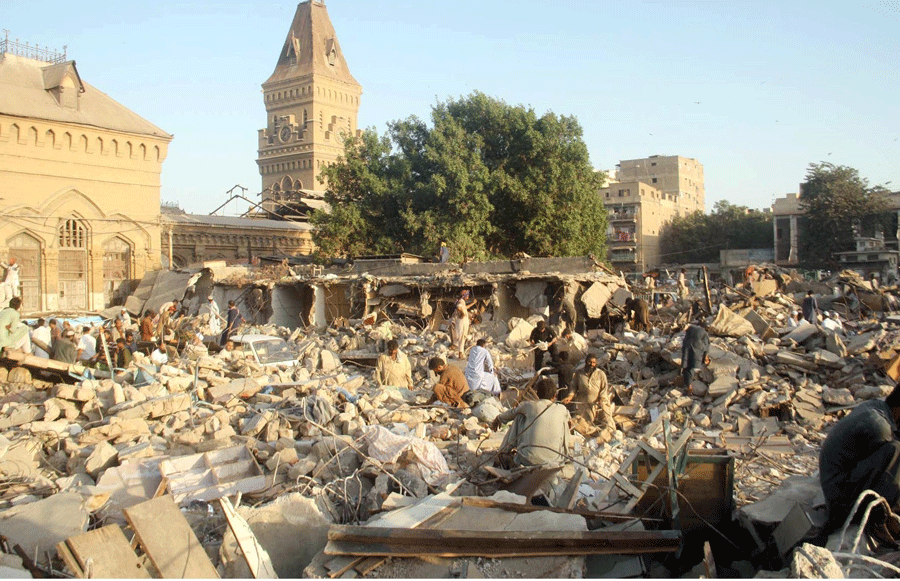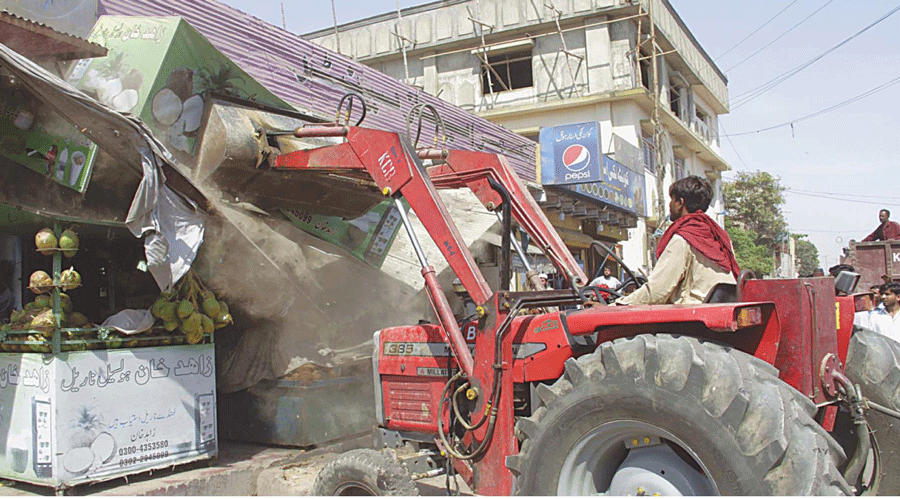The Crash of 2018
By Ali Arqam | Newsbeat National | Published 7 years ago

Shop owners in Karachi’s Empress Market, Arambagh, Landa Bazar and Burnes Road, were completely unaware of their predicament when their premises came under the axe of an ongoing anti-encroachment drive. Initiated on the instructions of the Supreme Court of Pakistan, the drive began in January, but its slow pace invited the Supreme Court’s wrath. Ultimately, on October 28, Karachi Development Authority (KDA) officials were ordered to recover 35,000 amenity plots – meant for parks, schools and dispensaries – that had been unlawfully occupied, while Mayor Waseem Akhtar was given 15 days to clear footpaths and pavements from encroachments.
On November 4, the drive started from Empress Market and 1,034 shops in the market and its immediate surroundings were razed to the ground within a week. Both the KMC and KDA conducted the drive in different localities. KDA officials submitted a report to Justice Gulzar Ahmed, saying that 5,000 shops and stalls had been removed in Empress Market, Arambagh, Jamia Cloth Market, Burnes Road, Frame Gali, Gulshan-e-Iqbal, Gulistan-e-Johar, NIPA Chowrangi and other localities.
The demolition team entered Landa Bazar, a used clothes market, on November 20. Noorullah, the owner of one of the demolished shops said, “We were not given any notice in advance, though we had heard about the plans on TV. Most of us had already shifted our stock from the shops, but a few shops had not yet been vacated when the bulldozers came. The material in the shops was buried under the rubble and the owners received no compensation for their loss.”
The market, with its 300 shops and several hundred stalls was destroyed when, all of a sudden, KMC officials appeared on the morning of November 20 with heavy machinery, accompanied by contingents of Rangers, Police and city wardens. They gave two hours’ notice to the owners to remove their goods, and started demolition work amidst protests and entreaties.

Hakeem Shah, Chairman of the All City Tajir Ittehad, a traders’ body, and President of the Lighthouse Market Association, runs a carpet import business. He is also a member of the Karachi Chamber of Commerce and Industry (KCCI). Surrounded in his office by owners of the demolished shops, he recorded details of their shops and the nature of their business. Shah said, “We were owners of these shops under a legal arrangement since the 1950s, when hawkers on Bunder Road (M. A. Jinnah Road) were provided the space and ownership through an arrangement resembling the ‘Pagdi’ system – a pre-colonial tenancy system found across the subcontinent. Under this arrangement, the land of the markets was owned by the KMC, but the shops were [part-] owned by us, while we had to pay around Rs 10,000 in bi-annual instalments.”
He explained, “The Pagdi system is the equivalent of a lease agreement between the KMC and shop owners. When a shop was sold, tenancy would be transferred to another person; we would pay the KMC the transfer charges. It was all legal, we paid the rent and transfer charges through bank challans.” He added with a smile, “Bribes would be paid separately.”
“The agreement between the KMC and traders clearly mentions that they would be informed if the government proposed any change in the arrangement, but sadly, there was no formal communication from the officials about the immediacy or scale of the demolition they have undertaken. They came, gave two hours notice and started demolition. The Mayor and the Commissioner of Karachi refused to attend my calls.” He laments, “It was excruciatingly painful to see assets earned through decades of hard work, turned into rubble. We would have resisted the action, but the officials were accompanied by Rangers and police. Any resistance from our side would have created a law-and-order situation – we didn’t want it to turn ugly.
Shah continued, “The affected people are going nowhere; they are waiting for officials to come up with alternatives. And if this land is allotted or given away to someone else for doing business, they won’t allow it. They were instructed by the Supreme Court to go after encroachments, but they came after regularised markets.”
As many as 69 markets with more than 10,000 shops spread across the city in all districts were regulated by the Estate Department of the KMC. A couple of weeks before the demolition of shops started, Dr Syed Saif-ur-Rehman, a Municipal Commissioner at KMC, directed the Estate Department to issue fair-rent notices to the owners of shops in markets on KMC-owned lands. In a meeting at the KMC building, he expressed discontent over the minimal amounts received as rent from those shops, and emphasised that rent should be at par with market value. He asked the legal department of the KMC to prepare a new rent manual and issue fair-rent notices to the shopkeepers.
The cash-strapped KMC has been faced with financial issues since it was divested of most of its administrative and financial powers under the 2013 Local Government Act. A major chunk of fund transfers from the province goes towards salaries, allowances and pensions of KMC staff, and Annual Development Plan (ADP) funds are spent directly by the provincial government. The KMC is left with no choice but to generate its own revenues. Rent collection from the shops and offices it owns is one of the sources of income.
The debate on seeking fair rent from these shops and offices to increase KMC revenues has always existed. In 2015, rents were increased by 20 to 25 per cent. Last year, the Mayor constituted a committee to restructure the rents of 69 KMC-built markets and offices. It comprised the Chairmen of the Estate Committee and Finance Committee of the City Council, Adviser to the Mayor, Farhat Khan, KMC Estate Director, Qayyum Khan and KMC Senior Director, Nazeer Lakhani. The committee was to suggest a new rent manual, keeping in mind the current value of commercial sites.

Mayor Waseem Akhtar has been very critical of the performance of the Estate Department and claims KMC has been deprived of millions of rupees in revenue due to ridiculously low rents, with increments on low rates. Hence, KMC officials saw an opportunity in the court’s orders against encroachments and recovery of amenity lands. In a response to a question about rent documents possessed by the owners of shops in Empress Market, Waseem Akhtar declared, “All the rent agreements signed by the KMC stand cancelled.”
It is widely believed that the KMC has gone overboard and the drive has been severely criticised by social scientists, urban planners, architects and civic rights bodies who pose serious questions regarding its veracity. Renowned urban planner Arif Hasan has termed the action “inhuman” and “shameless.”
While there can be no argument with a clean-up of the city and the menace posed by wholesale and illegal encroachment of city lands allocated for hospitals, schools or parks, the manner in which measures are taken to address these issues needs to be seriously considered, taking into account humane concerns before embarking on such projects. Experts in the field need to be brought on board and consulted, and viable alternate arrangements made to provide livelihoods to those whose workplaces have been demolished. Unfortunately, none of this was done before the action in Karachi.
Despite the public outcry, the mayor is adamant and has clearly warned that those who resist will meet an iron fist. Nevertheless, if the KMC continues to go into other markets spread across the city with the same bulldozer mentality, it will inevitably lead to greater discontent.
Ali Arqam main domain is Karachi: Its politics, security and law and order


